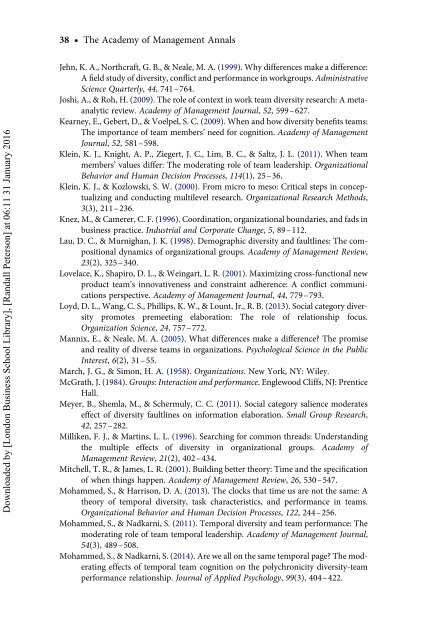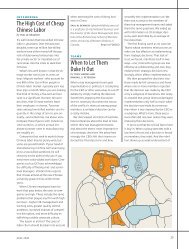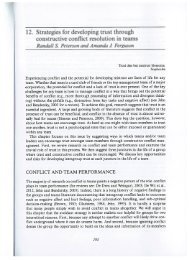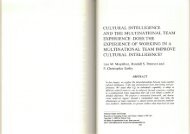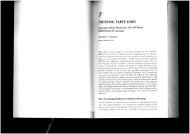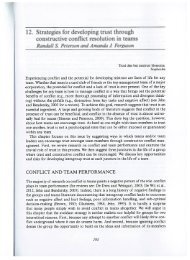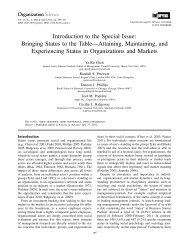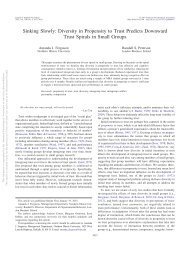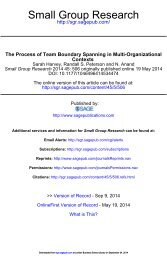A Dynamic Perspective on Diverse Teams: Moving From The Dual Process Model to A Dynamic Coordination-Based Model of Diverse Team Performance - Kannan Srikanth, Sarah Harvey & Randall Peterson
The existing literature on diverse teams suggests that diversity is both helpful to teams in making more information available and encouraging creativity and damaging to teams in reducing cohesion and information sharing. Thus the extant literature suggests that diversity within teams is a double-edged sword that leads to both positive and negative effects simultaneously.
The existing literature on diverse teams suggests that diversity is both helpful to teams in making more information available and encouraging creativity and
damaging to teams in reducing cohesion and information sharing. Thus the
extant literature suggests that diversity within teams is a double-edged sword
that leads to both positive and negative effects simultaneously.
Create successful ePaper yourself
Turn your PDF publications into a flip-book with our unique Google optimized e-Paper software.
38 † <strong>The</strong> Academy <strong>of</strong> Management Annals<br />
Downloaded by [L<strong>on</strong>d<strong>on</strong> Business School Library], [<strong>Randall</strong> Peters<strong>on</strong>] at 06:11 31 January 2016<br />
Jehn, K. A., Northcraft, G. B., & Neale, M. A. (1999). Why differences make a difference:<br />
A field study <strong>of</strong> diversity, c<strong>on</strong>flict and performance in workgroups. Administrative<br />
Science Quarterly, 44, 741–764.<br />
Joshi, A., & Roh, H. (2009). <strong>The</strong> role <strong>of</strong> c<strong>on</strong>text in work team diversity research: A metaanalytic<br />
review. Academy <strong>of</strong> Management Journal, 52, 599–627.<br />
Kearney, E., Gebert, D., & Voelpel, S. C. (2009). When and how diversity benefits teams:<br />
<strong>The</strong> importance <strong>of</strong> team members’ need for cogniti<strong>on</strong>. Academy <strong>of</strong> Management<br />
Journal, 52, 581–598.<br />
Klein, K. J., Knight, A. P., Ziegert, J. C., Lim, B. C., & Saltz, J. L. (2011). When team<br />
members’ values differ: <strong>The</strong> moderating role <strong>of</strong> team leadership. Organizati<strong>on</strong>al<br />
Behavior and Human Decisi<strong>on</strong> <strong>Process</strong>es, 114(1), 25–36.<br />
Klein, K. J., & Kozlowski, S. W. (2000). <strong>From</strong> micro <strong>to</strong> meso: Critical steps in c<strong>on</strong>ceptualizing<br />
and c<strong>on</strong>ducting multilevel research. Organizati<strong>on</strong>al Research Methods,<br />
3(3), 211–236.<br />
Knez, M., & Camerer, C. F. (1996). Coordinati<strong>on</strong>, organizati<strong>on</strong>al boundaries, and fads in<br />
business practice. Industrial and Corporate Change, 5, 89–112.<br />
Lau, D. C., & Murnighan, J. K. (1998). Demographic diversity and faultlines: <strong>The</strong> compositi<strong>on</strong>al<br />
dynamics <strong>of</strong> organizati<strong>on</strong>al groups. Academy <strong>of</strong> Management Review,<br />
23(2), 325–340.<br />
Lovelace, K., Shapiro, D. L., & Weingart, L. R. (2001). Maximizing cross-functi<strong>on</strong>al new<br />
product team’s innovativeness and c<strong>on</strong>straint adherence: A c<strong>on</strong>flict communicati<strong>on</strong>s<br />
perspective. Academy <strong>of</strong> Management Journal, 44, 779–793.<br />
Loyd, D. L., Wang, C. S., Phillips, K. W., & Lount, Jr., R. B. (2013). Social category diversity<br />
promotes premeeting elaborati<strong>on</strong>: <strong>The</strong> role <strong>of</strong> relati<strong>on</strong>ship focus.<br />
Organizati<strong>on</strong> Science, 24, 757–772.<br />
Mannix, E., & Neale, M. A. (2005). What differences make a difference? <strong>The</strong> promise<br />
and reality <strong>of</strong> diverse teams in organizati<strong>on</strong>s. Psychological Science in the Public<br />
Interest, 6(2), 31–55.<br />
March, J. G., & Sim<strong>on</strong>, H. A. (1958). Organizati<strong>on</strong>s. New York, NY: Wiley.<br />
McGrath, J. (1984). Groups: Interacti<strong>on</strong> and performance. Englewood Cliffs, NJ: Prentice<br />
Hall.<br />
Meyer, B., Shemla, M., & Schermuly, C. C. (2011). Social category salience moderates<br />
effect <strong>of</strong> diversity faultlines <strong>on</strong> informati<strong>on</strong> elaborati<strong>on</strong>. Small Group Research,<br />
42, 257–282.<br />
Milliken, F. J., & Martins, L. L. (1996). Searching for comm<strong>on</strong> threads: Understanding<br />
the multiple effects <strong>of</strong> diversity in organizati<strong>on</strong>al groups. Academy <strong>of</strong><br />
Management Review, 21(2), 402–434.<br />
Mitchell, T. R., & James, L. R. (2001). Building better theory: Time and the specificati<strong>on</strong><br />
<strong>of</strong> when things happen. Academy <strong>of</strong> Management Review, 26, 530–547.<br />
Mohammed, S., & Harris<strong>on</strong>, D. A. (2013). <strong>The</strong> clocks that time us are not the same: A<br />
theory <strong>of</strong> temporal diversity, task characteristics, and performance in teams.<br />
Organizati<strong>on</strong>al Behavior and Human Decisi<strong>on</strong> <strong>Process</strong>es, 122, 244–256.<br />
Mohammed, S., & Nadkarni, S. (2011). Temporal diversity and team performance: <strong>The</strong><br />
moderating role <strong>of</strong> team temporal leadership. Academy <strong>of</strong> Management Journal,<br />
54(3), 489–508.<br />
Mohammed, S., & Nadkarni, S. (2014). Are we all <strong>on</strong> the same temporal page? <strong>The</strong> moderating<br />
effects <strong>of</strong> temporal team cogniti<strong>on</strong> <strong>on</strong> the polychr<strong>on</strong>icity diversity-team<br />
performance relati<strong>on</strong>ship. Journal <strong>of</strong> Applied Psychology, 99(3), 404–422.


